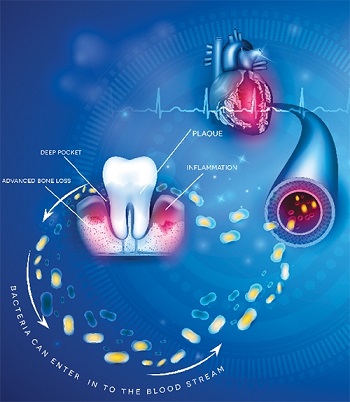The Heart—Dental Health Relationship

February is Heart Health Awareness Month, but it is also Dental Health Month. This is certainly appropriate because researchers are discovering that your heart health can be connected to your oral health.
According to Dr. Jim Haas of Haas Dental Associates in Derry, the American Academy of Cardiology and the American Academy of Periodontics recently issued a statement highlighting the correlation between heart health and dental health.
“The Academies noted that people with a gum disease have a higher risk of heart disease,” Dr. Haas said.
“The bacteria that attack the gums and causes gingivitis and periodontis can also travel to blood vessels elsewhere in the body, causing damage and inflammation. Inflammation is a known risk factor for heart disease. It can also lead to blood clots and stroke.”
People with gum disease can be two to three times more at risk for having a heart attack, stroke or other cardiovascular event, according to Harvard Medical School.
However, that does not mean that everyone with gum disease will develop heart disease. There are people with gum disease who have no heart issues, and there are people with heart issues who do not have gum disease. That said, the Academies feel that the connection is too strong to ignore.
“Periodontal disease increases the body’s burden of inflammation,” said Harvard researcher Dr. Hatice Hasturk, and long-term, chronic inflammation is a key contributor to plaque buildup in the arteries.
Dentists can help patients reduce their possible heart disease risks.
“As dentists, we don’t just look at teeth and gums, but at the patient’s general health,” said Dr. Robert Chaikin of Belknap Dental in Dover.
“We look for signs of disease and we ask questions. Periodontal disease may not be immediately visible – it can be a silent disease – so we ask patients questions, such as have they experienced bleeding gums while brushing? Are there any loose teeth? We note if they have bad breath.
All of these can be signs of gum disease. Patients often do not mention oral health issues unless there is pain, but periodontal disease can exist without pain.”
Dr. Chaikin said patients are often surprised when he explains that bleeding gums often mean that there is a problem.
“They’ll say, ‘But it only happens when I brush,’ and my answer to that is, if your arm started bleeding whenever you took a shower, wouldn’t you run to the doctor? It’s the same with your gums. Bleeding is not normal and the cause needs to be addressed. It can mean that there is a higher level of inflammation in the blood.”
Dr. Haas said if doctors suspect someone is at risk for heart disease, they often do blood tests that look for inflammation by checking for C-Reactive Protein. A higher level of C-Reactive Protein can indicate the presence of heart disease. The presence of gum disease may be a signal to your doctor that blood work is warranted.
“If a patient has moderate to severe gum disease, it would be wise for them to consult with their physician to see if heart disease is present, and what steps they need to take to reduce their risk factors,” said Dr. Haas.
“The good news is that gum disease can be treated and in most cases, healthy gums can be restored. Dentists can do scaling and root planning which will help remove plaque buildup around the teeth. They can also prescribe an antibiotic treatment if the infection is severe. We don’t know for sure that treating gum disease will prevent heart disease, but at least you are removing one risk factor.”
Both Dr. Haas and Dr. Chaikin emphasize that gum disease can occur in people of any age. Poor dental hygiene can be a contributor but some people are also more genetically inclined to have gum disease. The best way to prevent the disease is to brush regularly, floss, and see your dentist for checkups at least twice a year.
“Your dentist will perform bite-wing X-rays that check for gum disease and will also use a periodontal probe to measure gum health – the probe is inserted between the tooth and the gums to see how far it goes in,” said Dr. Haas.
“He will also look for other signs of inflammation, such as gum recession or ‘pocketing’ around the teeth. Gum disease can be hidden just like heart disease so X-rays can help with early detection. Those people who are more susceptible to gum issues may be advised to see their dentist more frequently, or may be referred to a periodontist.”
Periodontists are experts in treating oral inflammation.
“The good news is that by everyone being more aware of the possible correlation between heart disease and gum disease, steps can be taken right away to prevent gum disease and eliminate that risk factor,” said Dr. Chaikin. “Gum disease is preventable, and if you have it, it is reversible. Start taking better steps for oral health today, and if you have children, encourage good oral habits with them. Your heart will thank you.”
Story Credit: https://www.parentingnh.com/The-heart-dental-health-relationship/
Since you’re here, we have a small favor to ask. Requests from schools and districts for our screening services are growing, which means that the need for funds to cover the cost of those services is also growing. We want to make our services available to those who request it and beyond, so you can see why we need your help. Safebeat heart screenings take a lot of time, money, and hard work to produce but we do it because we understand the value of a child's life, PRICELESS!
If everyone who reads this likes it and helps fund it, our future would be more secure. For as little as $1, you can support Safebeat and it only takes a minute. Make a contribution. -The SafeBeat Team


